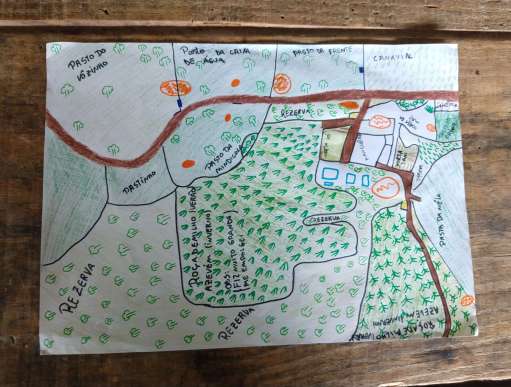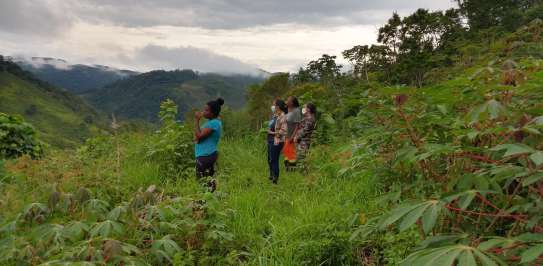Building alternatives is working to achieve a model of sustainable, feminist agroecology that considers the different relationships between men and women, and between people and nature.
In Latin America, social movements have strongly contested agribusiness models, providing an alternative sustainable agroecological model of production. However, these agroecological models generally exclude women's knowledge. Yet, it is often women who have used small-holder agricultural methods to feed their families, while men are hired to work on large monoculture industrial farming systems.
Building alternatives is a project gathering evidence to build a feminist agroecological model in Brazil through two main activities: the development of a training course and research.
Brazilian women farmers and their families will be both the future course students and the research participants in the project.
What does feminist agroecology look like in practice?
The research aims to explore what a feminist agroecological model looks like. It is based on an in-depth investigation of four women farmers from different cultural and ethnic backgrounds and family structures.
The research aims to analyse the various agro-ecosystems that the women have developed, their role in transforming and commercialising agricultural products, their way of life and their integration in women's groups and networks, as they are all part of RAMA, the Agroecological Network of Women Farmers in Barra do Turvo, a municipality in the state of São Paulo in Brazil.
The research also aims to synthesise and theorise about the work that Sempreviva Feminist Organisation (SOF), a Brazilian civil society organisation, has been doing on feminist agroecology for years.
This is a map drawn by women involved in the research project from Girássois do Vale in the area of Barra do Turvo, São Paulo, Brazil. The map shows reserved land, grazing land and fields set aside for sugar cane production.
Image credits and information

Innovative course on experimental feminist agroecology
A college course which sets out the principles of feminist agroecology has been approved by the Federal Institute of Sao Paulo. This is the first time that a college has designed an official course on agroecology with a feminist perspective which draws on rural knowledge, and recognises women's knowledge and contributions to agrarian reform in the state of Sao Paulo.
The course aims to train youth and adult farmers from traditional villages, but also those carrying out urban and peri-urban agriculture. The course is the result of a public-civil society collaboration between the Federal Institute of Education, Science and Technology of São Paulo (IFSP) and Christian Aid's Brazilian partner Sempreviva Feminist Organisation (SOF), and will be delivered by the IFSP annually. Find out more.
Further project information
Building alternatives is funded by the British Council as part of Newton Fund Impact Scheme.
Partners and their roles
- Sempreviva Feminist Organisation (SOF), a Brazilian NGO, coordinates and leads all aspects of the project.
- Federal Institute of Education, Science and Technology of São Paulo (IFSP), a Brazilian higher education institution, coordinates the training course with SOF.
- Research, Evidence and Learning Team (REL) at Christian Aid coordinates the research workstream of the project with SOF and the Open University.
- Coventry University in the UK will lead on the dissemination of research results in Brazil and the UK, ensuring it reaches academic and student audiences in English and Portuguese.
Project team
- Ms Miriam Nobre, SOF, project manager
- Ms Alexandra Filipak, Ms Elaine Alves Raimundo, Dr Fernanda Cristina dos Santos, Dr Flávio Aparecido Pontes, Dr Leandro Vieira, Dr Raquel Souza Mattana, Ms Vivian Delfino Motta, who are all teachers and researchers at IFSP.
- Dr Kas Sempere, REL-Christian Aid / Open University, Principal Investigator
- Ms Vivian Franco, SOF, investigator
- Ms Sheila Saori, SOF, research assistant
- Ms Gláucia Marques, SOF project officer
- Dr Marta Rivera, Coventry University
- Lais Costa, SOF, financial manager
- Carlos Salinas, Christian Aid, financial manager
- Blanca Lacayo,Christian Aid, Monitoring & Evaluation manager
Advisory group
A “committee of wise women” provides the project with their critical view and advice at key moments.
- Dr Marta Rivera, Coventry University.
- Dr Christine Verschuur, Graduate Institute of International and Development Studies (IHEID), Geneva, Switzerland
- Dr Isabelle Hillemkamp, Institut de recherche pour le développement, France
- Dr Emma Siliprandi, FAO Lead Focal Point for the “Scaling up Agroecology” Initiative
Research outputs
(Re)acknowledging Feminist Agroecosystems: summary research report which explains how women farmers in Vale do Ribera, Brazil contribute to gender equality, to maintaining their communities’ ways of living, to the care for nature and climate change, and to the building of food sovereignty.
(Re)conhecendo a agroecologia feminista: resumo de pesquisa (in Portuguese)
Updated literature review (in Portuguese) on the theory and practice of feminist agroecology in Brazil and worldwide, in Cadernos de Agroecologia (Agroecology Notebooks).
Funding
Building alternatives is funded by the British Council as part of Newton Fund Impact Scheme.
Further questions? Email SOF: sof@sof.org.br
